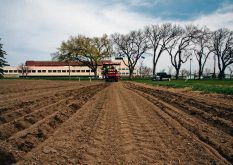The federal government needs to get its house in order if it wants an effective national food policy.
In particular it needs to provide more co-ordinated policies for farmers, according to Jack Froese, president of the Canadian Canola Growers Association, speaking recently to the Commons agriculture committee in Ottawa.
The problem isn’t a lack of programs — there’s currently no shortage of government and private sector initiatives to boost agricultural competitiveness — but rather it’s the lack of a co-ordinated “whole-of-government approach to food in Canada,” Froese told committee members, who are studying a new national food policy.
Read Also

Canada’s import ban on Avix bird control system ruffles feathers
Canadian producers’ access to Bird Control Group’s Avix laser system remains blocked despite efficacy studies and certifications, as avian flu deaths rise.
“Any new activity must build on existing initiatives and not duplicate efforts or create burdensome new requirements on the agriculture sector,” said Froese, who farms near Winkler.
A co-ordinated approach on agriculture competitiveness, food safety framework, improving the health of Canadians, sustainable production practices, and safeguarding the health of plants and animals “can help prevent a patchwork of initiatives and mixed messaging.”
“Ambitious export targets and free trade agreements must be coupled with the resources needed to address market access problems as they arise,” he said. “Desires to increase food literacy must be coupled with plans and targets. And government proposals from one department should not impede the goals of another by eroding the competitiveness of the sector or create unnecessary uncertainty. A whole-of-government approach will also ensure that one stakeholder group is not harmed at the expense of the other.”
He added governments need to rely on sound science in setting goals for protecting the environment, noting that advances in plant breeding, particularly genetic modification, are key achievements that help lessen the environmental footprint of farms and enabled canola growers to become “world leaders” in sustainability.
He pointed to the adoption of zero- or minimum-till farming, which 65 per cent of western farmers have adopted. Not only does it keep carbon from greenhouse gases in the soil, it has maintained and even improved farm soils for the future.
“While there is always room for improvement, current environmental practices must be recognized when determining targets and actions,” Froese said.
He spoke of his own personal experience adopting better farmer practices to “ensure the farm and its land are in even better shape when I pass it on to my children, or some other generation.”
Government also needs to work at educating the public on food production, the “world-class” regulatory system Canada employs to ensure food safety and what constitutes healthy food choices. He emphasized this public outreach is now more important than ever.
“We recognize that the vast majority of Canadians no longer have a tie to the farm and there is a growing disconnect between farmers and consumers,” Froese said.
“Food literacy will be key to help consumers make more nutritious food choices and be more aware of modern agricultural practices. We need to build understanding between consumers and farmers.”
Without an increase in food literacy, any food policy will struggle to move forward and achieve its desired outcomes, Froese told the MPs.
“A food policy can create a formal platform to help us achieve this by providing consistent messages across governments and stakeholders,” he said. “Farmers already produce high-quality, safe, and sustainable food and, with a competitive environment and the right tools, are well positioned to further grow Canadian production for both our domestic and international markets.”
He also pitched for greater farmer involvement in the process of setting the national food policy.
“Farmers are the driving force behind food production in Canada. It is critical that farmers and farmer organizations be actively involved to get buy-in to the outcomes,” he said. “An appropriate governance structure, such as a national food policy council, could be a mechanism to include a diversity of views in the development, refinement, and implementation of the policy. But farmers and farmer organizations must be well represented, as the policy can and will directly impact their livelihoods.”















